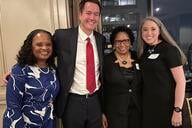You have /5 articles left.
Sign up for a free account or log in.
The Portuguese have a word, saudade, that translates as “presence of absence.” It describes the experience of being virtually connected and physically apart. After a year of remote learning, working and socializing, many of us can relate to this experience.
Technology allows us to connect remotely, but it can be challenging to maintain the social connection that comes from being in person. Trying to have conversations in big groups is awkward, with everyone trying to talk at the same time. So many of us have dropped the small talk that helps to maintain connection and provides the social lubrication important to maintaining relationships.
And it gets worse as time goes on. As Zoom fatigue has set in, most of us have wanted to spend less time trying to connect with people, not more.
Staying connected -- with students, with colleagues, with each other -- is not impossible during this time, but it requires intentionality.
Prior to the pandemic, internal communication to current students, faculty and staff was not a huge part of my job. I received ad hoc requests to assist with internal communication, but it wasn’t something we approached in a strategic, integrated way. But that changed quickly. As the centralized marketing and communications group on campus, we’ve been tasked with creating programs that keep students, faculty and staff connected during the time when most of the students are still studying remotely and those of us who are on campus are meeting on Zoom.
When the internal audience became our primary audience last March, we were faced with communicating rapidly changing information and plans as the COVID-19 pandemic unfolded. As time went on, and we started a new academic year, our objective broadened. We needed to keep the campus community updated about COVID-19 plans, and we needed to keep people feeling connected when the overwhelming majority of students were studying remotely and the rest of us were meeting on Zoom.
In September we launched an integrated communications program to reinforce information members of the campus community needed to know and to keep them feeling connected. Called Spartans Together, it included the following elements:
- Weekly video -- These short, one- to two-minute videos reminded people that campus life continues. The most-watched video featured our mascot, Sammy Spartan (in a custom-made mask) working out with our athletic teams, and a recent one had him remembering to file his FAFSA. Many reflected holidays or seasons. For MLK Day, we featured clips of students reflecting on his legacy. And the holiday video featured faculty, staff and students sharing what they wanted for Christmas.
- Bimonthly deans’ newsletters -- These templated newsletters provide letters from the dean, including school-specific information as well as key academic dates and reminders (many, many reminders to socially distance, wear masks and wash hands.)
- Weekly academic affairs newsletter -- These newsletters include a version for students and provide new information and reminders about classes, due dates and other general information from academic leadership.
To make sure we were including relevant and important information across all of our channels, we developed an editorial calendar with key messages by week.
If a big part of my team’s job has been to keep the campus connected, a big part of my job has been to keep my team connected. Even those of us who are going into the office are missing social interaction. We sit in our offices or cubes, socially distanced from each other, and hold meetings on Zoom.
To keep our team feeling connected, we’ve incorporated new elements into our regular staff meetings. Our meetings now devote as much time to socializing as we do to work. In advance of the meeting, I send out three to four questions for each person to answer. In addition to sharing progress and challenges on work projects, we share things we’ve learned and things we’ve learned to do during the pandemic. And everyone comes with a recommended book, movie, TV show or podcast. Recently, everyone came with recommended baby names for a colleague who is about to give birth.
What are you doing on your campus to keep everyone connected?
Deborah Maue is the vice president for marketing and communications at Aurora University in Aurora, Ill.




